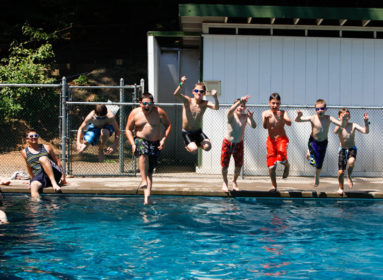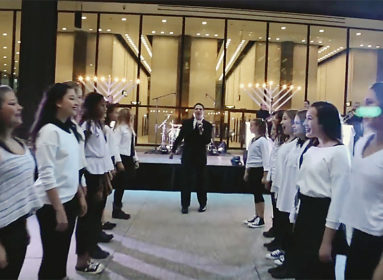 Pro-Israel college students prepare for a tough year
Pro-Israel college students prepare for a tough year
By Cindy Mindell
When Israel declared its statehood 65 years ago, there was little ripple effect at American universities. At the time, “campus anti-Semitism” referred to the Jewish quotas applied to student and faculty applicants to certain institutions of higher learning. But those rebuffed candidates could and did turn to alternative institutions, put the institutionalized racism behind them, and get on with their education or teaching.
Over the decades, however, as the relationship between Israel and the adjacent Palestinian territories has become increasingly complex and perilous, many North American college campuses have come to reflect the conflict.
Today, more than 40 percent of American-Jewish college students report that they have experienced or are aware of anti-Semitism on their campuses, according to the Louis D. Brandeis Center for Human Rights Under Law.
That’s the statistic during relatively normal times.
What happens when Israel is at war and global anti-Semitism is on the rise? This question is the key talking point as Jewish campus organizations prepare for the new academic year.
At a time like this, “the arguments and stereotypes don’t change; you just see more of them,” says Josh Sayles, assistant director of the Anti-Defamation League (ADL) Connecticut Region. “Anti-Israel activity and anti-Semitism always increase whenever there’s conflict in the Middle East and whenever there’s a problem with the economy.”
Since the second intifada, in 2000, many college campuses have seen an increase in Israel-related demonstrations and activity. Where the rhetoric is most heated, Jewish students are harassed verbally and physically, solely because of their actual or perceived identification with the Jewish state.
In the wake of the newly-formed global BDS (Boycott, Divestment and Sanctions) movement organized against Israel, a 2005 briefing report by the United States Commission on Civil Rights recognized an increase in anti-Semitic hostility and intimidation on several college campuses, both inside and outside the classroom, often cloaked as criticism of Israel. The commission defined the phenomenon as “a serious problem that warrants further attention.”
Since the commission’s findings, the anti-Israel climate on some U.S. campuses has only worsened, spawning responses from new and existing Israel-advocacy organizations, including Hillel International, ADL, the Brandeis Center, and StandWithUs, among others.
In “While Global anti-Semitism Surges, Don’t Forget U.S. Campuses,” a recent op-ed published by JNS.org, Tammi Rossman-Benjamin writes that a “new flood of anti-Jewish sentiment will come to campuses already racked by the virulently anti-Israel actions of student groups such as Students for Justice in Palestine (SJP), whose members are often aided and abetted by anti-Israel faculty.”
Rossman-Benjamin is a lecturer at the University of California, Santa Cruz and co-founder of the AMCHA Initiative, a non-profit organization that combats anti-Semitism on college campuses. In the piece, Rossman-Benjamin catalogues several first-hand accounts by Jewish students across the country who reported feeling unsafe on their campuses. But even in the face of this “clear and present danger” facing Jewish students on U.S. campuses, Rossman-Benjamin claims that, in most cases, university administrators are unwilling to address the problem, “preferring instead to defend the freedom of speech or academic freedom of the student and faculty perpetrators.”
Gone are the days when a college-bound Jewish teen only had to procure school supplies and dorm-room furnishings. Now, the packing list must include knowledge of the Israel-related environment on campus and awareness of the resources available to confront anti-Zionism or anti-Semitism.
Where to begin? As a first step, the Brandeis Center for Human Rights Under Law advises that students know their legal rights. The independent, civil-rights non-profit is the only organization that educates, trains, and supports American law students on issues of concern to the Jewish community, including campus anti-Semitism and the BDS (Boycott, Divestment and Sanctions) movement against Israel.
“We expect that campus anti-Semitism will explode in the fall: there are ugly protests around the world and we are preparing for very difficult academic year in terms of anti-Israel activity,” says Kenneth L. Marcus, president of the Center. “We are working to get college students ready nationwide.”
Among the information available on the organization’s website is a guide to the law against campus anti-Semitism. Title VI of the Civil Rights Act of 1964 prohibits discrimination in federally-assisted programs and activities, including nearly all public and private colleges and universities, on the basis of race, color, or national origin. Since 2004, this protection has been extended to Jewish students. When discrimination occurs, the university must promptly and adequately respond.
Through its litigation initiative, the Brandeis Center monitors U.S. campuses to ensure compliance with federal and state civil-rights laws that protect Jewish students from discrimination, harassment, and hostile environments. Whenever possible, the organization works with university administrators to encourage voluntary adoption of best-practice responses to anti-Semitic and anti-Israel incidents. If necessary, Brandeis Center lawyers are prepared to commence legal action to fight discrimination against Jewish students.
Students or faculty who encounter anti-Semitic or anti-Israel incidents on campus can contact the center’s lawyers for advice and support free of charge.
Over the last academic year, the Center launched several law school chapters around the country, at UCLA, American University, University of Pennsylvania, and Northeastern University. This fall, two new chapters will open at the University of Virginia and Fordham University. In January, the organization hosted its first National Law Student Conference to provide education and training in campus anti-Semitism, pro-Israel advocacy, and civil-rights law.
Some Jewish students report being exposed to anti-Israel rhetoric from their professors. Josh Sayles of ADL Connecticut says that while freedom of speech on an academic campus is a complex issue, there is a clear line to remember.
“If you’re in Middle East studies class, your professor can say anything pro- or anti- either side, within the realm of academic freedom,” he says. “But if you’re in a calculus class and your professor starts spewing hate speech, there may be some recourse because their views on the Middle East have absolutely no bearing on calculus.”
While students may be reluctant to raise the issue for fear of jeopardizing their grade, Sayles encourages them to bring the concern to their faculty advisor or to the ADL to figure out an appropriate response. ADL Connecticut is putting together a packet of resources geared toward college-bound teens, which will be made available to synagogues throughout the state.
Another source of print and online materials is StandWithUs, the Los Angeles-based international non-profit pro-Israel advocacy and education organization. With a presence on university campuses throughout the U.S., StandWithUs maintains 16 offices across the U.S., Canada, Israel, and the UK. Through publications and online resources, speakers, programs, conferences, missions to Israel, campaigns, and social media, StandWithUs works to keep the “story” of Israel accurate by educating campuses and communities about the country’s achievements and ongoing challenges. This summer, the organization’s Emerson Fellowship training conference prepared campus student leaders in Israel-advocacy campaigns and educational initiatives and coalition-building.
Resources and materials can be found at standwithus.com.
Yoni Kaplan is StandWithUs campus coordinator for the tri-state area, working over the past year at Yale, Trinity College, UConn, and Wesleyan University.
As liaison between each campus community and the resources provided by StandWithUs, Kaplan works closely with student leaders and on-campus Israel professionals, like the Jewish Agency Israel Fellows at Yale and UConn, to support their efforts to educate others about Israel on campus. He also guides students through the application process for StandWithUs programming micro-grants and on executing the resulting Israel-related programs.
“One of the most rewarding aspects of my job is doing campus visits where I actually get to sit down with the students and provide on-site training and education,” Kaplan says. “The students on Connecticut campuses are doing tremendous work. They’re passionate about Israel and are hungry to learn the best ways to share their love for the country with the rest of the student body. I also have to commend the Jewish Agency Israel Fellows at Yale and UConn Hillel who bring incredible energy and leadership to inspire their students.”
Hillel International is preparing educational resources to help its professionals and students on campuses worldwide understand the issues surrounding the current situation in Israel and Gaza, while maintaining a culture of civility and respectful dialogue.
Specifically, the organization is implementing policies and procedures to ensure the physical safety and security of its students, professionals, and facilities.
“Hillel is the central address of Jewish life on campus, and therefore plays a leading role in convening and leading the Jewish campus community,” says Eric Fingerhut, president and CEO of Hillel International. “We stand ready to support the deep and unbreakable ties between the Jewish people and the State of Israel this fall by helping our students strengthen their connections to Israel and the global Jewish community.”
Over the summer, Hillel has provided its campus professionals with training and professional development programs at the Hillel Institute at Washington University and via webinars, and is preparing the 68 Jewish Agency Israel Fellows to Hillel who will serve on North American campuses this year. In addition, the organization is working to further educate and engage the 4,000 students who participated in recent Hillel-led Taglit-Birthright trips to Israel.
Hillel is dedicating funds raised from special grants to 50 campuses in need of additional support to face anti-Israel activities. A new Israel initiative, Hinenu, is being implemented by Shelley Kedar, the first-ever vice president of Israel Education and Engagement, jointly appointed by Hillel Interest and the Jewish Agency for Israel. Hillel is cooperating actively with the Israel on Campus Coalition, which will support pro-Israel programs on campuses through targeted grants.
At UConn, Hillel has been proactively strengthening relationships on campus, where students are generally apathetic regarding Israel, says director Gary Wolff. Hillel has concentrated on Israel educational and cultural programs, and enjoyed robust Taglit-Birthright participation.
“We always plan for the worst, hope for the best, and create the environment to enable the best,” says Wolff. “The most important thing for us is to make sure that students are engaged and educated.”
In addition, Wolff and his colleagues work to strengthen Hillel’s relationship with UConn administration. They have already discussed student opportunities in Israel with the Education Abroad office, briefed the Residential Life programming coordinators on the resources Hillel can offer to students, and met with the Office of Admissions to discuss possible concerns of Jewish applicants in the wake of the Israel-Hamas conflict. Wolff says that this year’s freshman class has the largest percentage of Jewish students in UConn’s history.
As to the Israel climate on campus once those students arrive, Wolff anticipates one of three scenarios.
“Nothing: students will come in, have opinions but not act on them, want to converse and be educated about the situation with our student life coordinator or with Algom Ben-Horin [Jewish Agency for Israel Fellow] or with me,” he says.
Or the opposite: “The three Muslim and Arab groups on campus – the Iranian Student Association, the Muslim Student Association, and Students for Justice in Palestine – choose to create a visible demonstration or protest around what’s going on in Israel and make students with an affinity with the state of Israel, especially Jewish students, uncomfortable,” Wolff says. “For that eventuality, we’ve put a plan into place.”
Or something in-between: “One or two groups will create a visible demonstration,” he says. In that case, Hillel will activate its educational resources and call on already-established positive relationships with fellow student groups in order to create dialogue. For example, the Iranian Student Association and Huskies4Israel have fostered a good working relationship.
“There’s a fine line between freedom of speech and hateful speech,” Wolff says. “As long as the students exercise their freedom of speech, it creates an equal opportunity for dialogue, programmatic experience, and unity of the Jewish community. But if there is hateful speech and other activities like fake eviction notices [distributed by students at NYU in April], we will have to look into the resources and relationships we’ve put into place in order to respond in a professional, positive way.”
Hillel’s mission is to make sure that every Jewish student who chooses to attend UConn can feel safe and comforted, Wolff says. “Students returning from Birthright trips, who might not have been vocal about Israel before they went to Israel, may now be put off by social-media and media portrayals of Israel,” he says. “If they want a place to express their views, Hillel can offer the sanctity of freedom of expression, a place to be comforted, and the knowledge that, as an organization, we support the views and continued involvement and integrity of the Jewish community at UConn.”
Rabbi Susan Schein, the newly appointed director of Connecticut College Hillel, sees her role as providing a safe and welcoming place for all students on campus.
“The goals of Connecticut College Hillel are in keeping with the college’s goals of developing a diverse and inquisitive community and being a welcoming building,” she says. “Hillel is part of the Office of Religious and Spiritual Life at Connecticut College, which seeks to help students form a spiritual, ethical, and moral foundation that will prepare them to lead lives of integrity, civility, and compassion. In keeping with those goals, my intention is to approach the topic of the conflict in Gaza with open discussion and dialogue in an environment of civility that communicates the depth of the issues and not just the rhetoric. Essentially, we want to meet students where they are and have an authentic response to each student’s questions and concerns.”
Rather than take any proactive steps on her own, Schein says that she will discuss ideas with Hillel’s student leaders and collaborate with them on programs that meet their needs.
In the past, Hillel students have engaged with Yalla Bina, the Arabic Club at Connecticut College. Schein says that she hopes Hillel can continue that dialogue and continue to develop positive relationships with all groups and perspectives on campus.
Vera Schwarcz, Freeman Professor of East Asian Studies at Wesleyan, uses the example of her alma mater to describe what she sees happening on many U.S. college campuses.
“Vassar College is a quiet, very beautiful, and relatively isolated campus where genuine open-mindedness used to thrive,” she says. “Last year, a group of Vassar alumni contacted me. They had their fingers close to the pulse of campus life and discovered fiercely anti-Semitic programming by anti-Israel faculty and students who had pretty much hijacked the campus discourse. I was shocked. A student-run website had posted anti-Semitic cartoons. The administration was slow and rather weak in making any kind of response. The alumni, of disparate generations, took the lead in organizing a ‘Fairness to Israel’ association that is meant to encourage students and faculty to explore a truly diverse point of view, rather than the conventional anti-Israel rants that are the usual academic fare.”
At Wesleyan, things are a bit better, Schwarcz says. “President Roth was one of the first to come out against the BDS ‘movement.’ But a deeper problem remains: across the campuses, the issue is both the prestige and dogmatism of faculty, who are most vociferous in anti-Israel rhetoric. It is intimidating for students to articulate – even to conceive of – a pro-Israel position for fear of being deemed ‘uncritical.’ This is the most common and most burdensome label thrown about in the academy.”
Schwarcz says that, in more than four decades of teaching at Wesleyan, “I can count on one hand the number of students who dared to seek me out to discuss Israel – knowing that I had been there, volunteered for the IDF, and taught graduate seminars at Hebrew University. Whenever I publish an essay about events in Israel that argues the right for self-defense or raises questions about the unconscionable allegations concerning ‘apartheid,’ most student responses, alas, are fiercely critical.”
According to Schwarcz, the Chabad on Fulton Student Center at Vassar was the only place where students felt somewhat safe to express pro-Israel views, a phenomenon that she sees on other campuses as well.
Rabbi Levi Schectman directs Chabad at Wesleyan together with his wife, Chanie.
“Our perspective is more a wholesome approach – that one more mitzvah or act of kindness strengthens our Jewish identity, makes the world a better place, and helps the Jewish people wherever they are the world over,” he says. “In all of our programming – like lunch and learn, visiting faculty, challah-baking – we try to tie in that concept and focus on strengthening our Jewish identity and having pride in who we are.”
Schectman says that he has been approached by students who want to discuss anti-Israel activity on campus. “They haven’t asked for advice,” he says. “They’re very smart and can deal with it in whatever way they want to, and just want to have a conversation to gauge their feelings about it.”
Schectman can’t tell what the Israel climate will look like at Wesleyan come fall semester; “It depends on what happens in Israel in the days before school starts,” he says. “We try to create a space for students where they can feel safe comfortable expressing their views and opinions – and that applies to Israel-related activity on campus – or express their frustration that they’re not being heard. We want everybody to feel comfortable and respect one another’s opinions.”
The good news is that, unlike some universities known as hotbeds of anti-Israel activity – Rutgers and several University of California campuses among them – “we don’t see rabid anti-Israel activity on Connecticut campuses,” says Josh Sayles of ADL Connecticut.
No matter where Jewish college students end up, there are many resources and assistance available; the key is awareness. Sayles sums up the message of all Israel-advocacy organizations that work to prepare Jewish teens for campus life during an especially challenging time for Israel and Jews worldwide.
“We don’t expect teens to always listen to what we have to say,” Sayles says. “But if there’s one thing we want them to take away from this, it’s to know that we’re here, we’re a resource, and you can call us with questions or concerns.”
Comments? email cindym@jewishledger.com.
I-Pitch for Israel
ADL and UConn team up to empower Israel advocates on campus
By Cindy Mindell
STORRS – Even before the events in Israel and Gaza this summer, Jewish students at UConn were learning to become Israel advocates through a new initiative launched by the Anti-Defamation League (ADL) Connecticut Region, co-sponsored and co-hosted by UConn Hillel.
Piloted several years ago by the ADL’s San Diego office, I-Pitch for Israel is a five-part program designed to educate students about Israel and empower them to make their campus more Israel-friendly. Connecticut is the second ADL regional office in the country to sponsor the fellowship.
The first four sessions of I-Pitch address a wide range of topics on Israel and advocacy tools. “We talk about all sorts of positive things – research and development, technology, the country’s LGBT rights record, as well as coalition-building and how to organize a pro-Israel event,” says Josh Sayles, assistant regional director of ADL Connecticut. “We teach why Israel is relevant to students, even to those without Jewish connection to Israel. We want to get students passionate about the positive things relating to Israel so that they share that information with friends and colleagues.” Participants discuss issues of free speech on college campuses and learn the difference between anti-Israel activity and antisemitism.
Sayles says, “You don’t want to have a conversation about Israel that goes like this: ‘Israel is an apartheid state.’ ‘No it’s not.’ If the other person wins, Israel is an apartheid state; if you win, you’ve accomplished nothing.”
Instead, he says, there’s something of a viral effect when pro-Israel students talk about Israel to their friends or dorm-mates. “If those people then hear someone on campus say, ‘Israel is an apartheid state,’ even if they don’t have all the tools to respond, because they’ve heard an opposing view on the subject, they may not accept the accusation so readily.”
Lauren Simon (’15) got involved with I-Pitch in order to learn not only about the current situation in Israel, but also how to become an Israel advocate.
The Monroe resident says she came to UConn with little knowledge about Israel, filling in the gaps on a Taglit-Birthright trip the summer after freshman year and on the UConn Hillel executive board. “I-Pitch took this even further and I was able to learn about Israel and Israel advocacy from a variety of people and have meaningful discussions about Israel with other students,” says Simon, who has seen pro-Israel groups grow and become more prominent on campus.
“At the same time, anti-Israel groups have also been established,” she says. “While there have yet to be any massive anti-Israel demonstrations on campus, I fear that they will increase this coming year, given current events. Through I-Pitch, I learned about different aspects of Israel and how to discuss the conflicts in both a positive and factual way.”
Ryan Norton (’17) had been spending a lot of time at UConn Hillel when he was approached by Algom Ben-Horin, the Jewish Agency Israel Fellow to Hillel, who told him about I-Pitch.
“I was really excited by the opportunity to work with the people at ADL and learn about the Israel-Palestinian conflict from their perspective,” says the Trumbull native.
Norton says that high school friends attending Northeastern University have told him about Students for Justice in Palestine (SJP) events on that campus before the group had its organization status revoked by the university administration.
“My friends there are not Jewish but they mentioned that even they felt uncomfortable walking through campus and the surrounding areas where the demonstrations happened, and could only imagine how the Jewish students there must feel,” Norton says. “Northeastern experienced some violence from pro-Palestinian protests. UConn, being so close, cannot allow that mentality to spread. As a Jewish student at UConn, I feel a sense of obligation to help establish UConn as a place where debate and education come first before threats and violence,” he adds.
For the fifth I-Pitch session, participants submit a grant proposal and pitch ideas that they feel will improve the pro-Israel environment on their campus. ADL then provides seed money for the projects deemed to be well conceived and financially viable.
Norton and Simon teamed up to propose a pro-Israel week, which soon evolved into “Israel Peace Week” as students decided on their target audience.
“UConn is generally a politically apathetic campus, as far as the student body is concerned,” says Norton. “Most students do not care about the conflict at all or do not know anything about it, and we want to introduce them to Israel in a positive way.”
Norton and Simon are working with two fellow I-Pitch participants on the November Israel Peace Week program.
The program will include a number of visiting speakers who will present in venues other than UConn Hillel, so that non-Jewish students will feel welcome to attend. I-Pitch organizers will publicize and raise money for Save a Child’s Heart, an Israel-based international humanitarian organization that provides cardiac care for children from developing countries.
“Our goal is to give students a positive attitude about Israel so that they can get a better sense of what they see on CNN or read in various newspapers and other online media outlets concerning Israel,” says Norton. “In light of Operation Protective Edge, it is important now more than ever that students are exposed to the ‘true Israel,’ the Israel that contributes so greatly and selflessly to the world and just wants to be a competitive economic democracy like the United States; the Israel that is attacked constantly and relentlessly but would accept peace in a second if only it were offered in a comprehensive and lasting manner.”
The student organizers are mentored by Sayles, along with ADL Connecticut Region director Gary Jones, and Hillel Fellow Algom Ben-Horin. “This is a way to empower students at a young age so that they can see what they’re capable of doing for Israel,” says Sayles.
Norton says that he believes his I-Pitch experience will help strengthen the pro-Israel community at UConn, especially as the year-old chapter of SJP becomes more active on campus.
“I-Pitch and Israel Peace Week are our ‘pre-emptive strike’ against SJP, in order to protect UConn’s Jewish and pro-Israel communities,” Norton says. “We are helping to make sure that UConn doesn’t turn into [a campus like] Rutgers, University of Michigan, or many universities in California and across the country, where Jewish students have been subjected to anti-Semitism – including being targeted with mock eviction notices posted on their dorm-room doors and having to go through fake security checkpoints. SJP has also been known for hosting sometimes violent demonstrations that put the Jewish communities of these universities at risk.”
Norton sees the effects of I-Pitch and similar initiatives lasting after his four years on campus.
“I-Pitch is, in part, helping us insure that the University of Connecticut remains a center of Jewish life for future generations of students,” he says. “Through various speakers, we seek to help make our university a hub for discussion about Israel and the conflict, not a battleground.”
Comments? email cindym@jewishledger.com.








 Southern New England Jewish Ledger
Southern New England Jewish Ledger

















